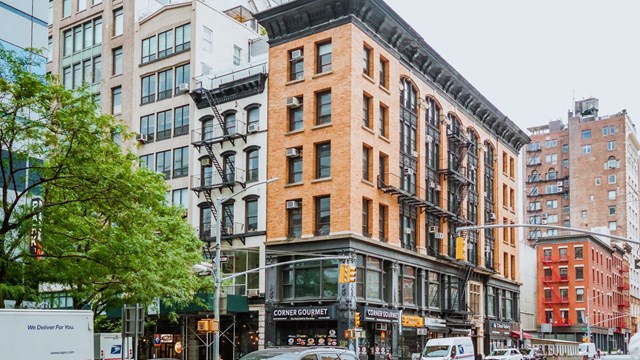For most co-op and condo owners, the question of whether or not their building's doorman or concierge or security guard is unionized is a non-issue - one that only comes up when lengthy contract negotiations loom on the horizon. The subtle differences between union and non-union staff, though, can play a large role in how a building is run, affecting everyone who lives and works within its walls. Understanding how a union and its membership work can help your board and management maintain a smooth co-op or condo operation.
The question of which is better - union or non-union staff - is a difficult, if not impossible, one to answer. "One of the problems is that there really are no standards to compare the two," says Dick Koral of the New York Supers Club. "There are no job descriptions for supers, for example. A super's job has to be negotiated before hiring." Meaning the job is defined by each building, not by a union or its members. What that means, too, is that there is no real contextual framework within which to compare the services provided.
For John Hammell of maintenance worker's union SEIU Local 32BJ, that's a moot point. The real differences come in how well a job is done. "A major benefit [to unionized staffing] is the lack of turnover," he says. Because employees stay longer, "they do their jobs with a greater degree of care. The more secure and better paid they are, the longer they stay, and the more invested they are in their work."
SEIU Local 32BJ represents 70,000 building service employees, from cleaners to porters to superintendents and security guards, all located in the tri-state area. Sixty thousand of those members work in New York City alone. The largest building service union in the country, Local 32BJ is also the largest private sector union in New York City.
The union's expansiveness is one of its strengths, says Hammell, and that provides one of the most important benefits to co-op and condo owners. "There are political benefits to having a unionized building," he says. "[The union is] becoming a more powerful force," and is therefore able to lobby on behalf of residents, as well as its own members.
The union is also engaging in a program that it hopes will safeguard co-op and condo residents throughout the city. Since the union represents security guards, doormen and concierges, it knows its employees often serve as the first line of defense against criminal or other dangerous activity. Working with the New York City Police Department (NYPD), the union is training staff to work with union members, showing them how to spot trouble and take effective action in emergency situations. Long-term staff know the habits and practices of building residents, says Hammell, which in turn means they know when something is off or different. The union takes this responsibility seriously, he says.
One of the drawbacks of having a unionized building can occur if an employee begins to fail in his or her job. "One of the real differences between union and non-union employees is that it's very difficult to fire a union worker," says Koral. "He can always call the union defender to come over and talk on his behalf."
But, Hammell equally believes that union involvement can work in favor of residents just as much as the employee. "Managers, boards and residents have someone to complain to if work isn't being done," he says. "We make it clear [to our members] that if we get a report that a guy's not doing his job, we won't dismiss it, saying, "˜Oh, it's the bosses.' We investigate and if the guy deserves disciplinary action, we give it. We're firm believers in an hour's pay for an hour's work."
Other bumps may exist along the road as well. "There are myriad pitfalls," says attorney Bernd Allen of the Manhattan law firm of Allen Morris Troisi & Simon, LLP. "Having a unionized staff means having restrictions on the kind of work each employee does. If you have an elevator operator, you can't ask him to shovel snow." Because of this, says Allen, "when you have a unionized building, you tend to have more employees doing less work because you can't cross lines of profession. Therefore, there tends to be a larger number of employees in each building."
"[Boards and managers] also have to be careful about overtime procedures," Allen says. It's vital that all of the rules and regulations found in the contracts between union and industry are followed as near to the letter as possible. "You always have to comply with union rules."
The overall percentage of unionized co-op and condo buildings versus non-unionized is not that high, Koral says. He estimates that of the roughly 100,000 buildings with supers in New York City (not all of them co-ops and condos), around 3,000 have union superintendents.
This is not so much representative of the popularity or acceptance of unions, but rather a matter of economics. Most large buildings - Trump Towers, for example - have unionized building staffs. "The union has concentrated in the past on elevator buildings where you have a large staff - handypersons, porters, a concierge," Koral says. "These buildings are relatively easy to organize and relatively well-heeled." Meaning that staff can afford union dues, and management can afford the increased pay and benefits inherent in most union contracts. Larger groups, too, are easier to bring into the fold compared to small, potentially scattered staffs found in six- to eight-family buildings. Most of those buildings, Koral says, are non-union.
Speaking about unionizing efforts, he says, "The union has a new administration dedicated to reaching everyone. How much progress they'll make, I'm not sure. Not all buildings are doing so well, so it's hard to get them to raise pay and give benefits."
Hammell believes that SEIU will continue to thrive - especially given the way they can help employees. "We offer free legal services, good health care plans. "Even during these rough economic times, our membership has increased," he says. "We've grown, merged with other locals and gotten the deserved reputation for getting the job done right. There's no class warfare mentality."
Of course, even in the best relationships, problems can arise. The same is true of the relationship between co-ops, condos and their service workers. The contract between building staff and the co-op and condo industry is renegotiated every three years, with the next talks scheduled for April 2003. This past year, negotiations went smoothly and quickly, with both sides eager to resolve potential conflicts in the emotionally raw aftermath of a post-September 11th metropolis.
Keeping relationships smooth and easy is in the best interest of everyone involved. "Buildings don't get filled with our people because we force them on anyone," Hammell says. "We work by reputation and goodwill." He adds that in unionized buildings, union staff are not automatically hired. The building hires the staff that it wants and then those individuals are asked to join. Management has a voice in everything that goes on in the building, he explains.
When and if conflicts arise, everyone seems to agree that the best course of action is communication. "Don't let conflicts get to the point of strikes," Hammell says. "Everyone should talk before it gets to that. This union is pretty responsive."
This is particularly true in the case of contract talks. "If a contract is going to expire, people should be talking at least 60 to 90 days in advance. People take less flexible positions when they're under pressure. The more you know before it gets to the table, the easier it is to get to the main issues and get rid of the side show stuff."
Talking keeps things moving, avoiding the type of stagnation that can lead to strikes and drawn out conflict. "Most problems are resolved through the union," Allen says, whether its individual staffing issues or other, larger matters. Resolving matters before they reach the picket lines is vital to keeping buildings running smoothly. "Many people are reluctant to cross picket lines," Allen says. "They see people who work in their building everyday and it can get very awkward. There is a great deal of pressure to resolve those types of disputes."
As long as everyone keeps talking, though, the odds for a successful relationship between union members and the buildings in which they work is very high indeed.







Leave a Comment